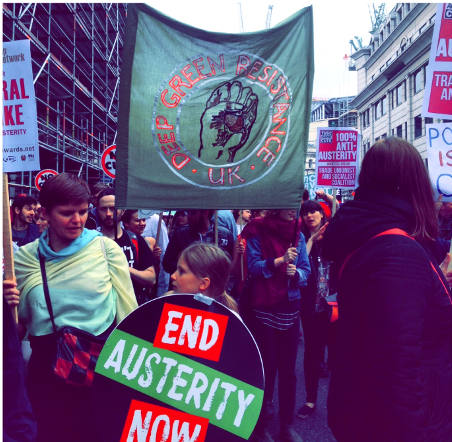
“if we don’t break’em, our lives they will take’em.
Our croft, our cottage, our village as wello.
No freedom or laughter for those who come after,
But a servant and master in a factory hell.”
Seize the Day: General Ludd
Essay by Ben Ludd
Resistance is fertile. It strengthens. It works. It never dies. We are taught to accept progress as if it were inevitable and always desirable. The relentless growth of cities is neither: a quick look at history shows why.
While the dominant culture uses the word “Luddite” negatively to describe people who are against progress, I use it as a compliment to describe those who fight back using the tactics they deem most effective. We are told that Luddite means “One who is opposed to technical change.” However, the Luddites were not opposed to all forms of progress. They did not destroy labour saving devices indiscriminately. On the contrary, they chose their targets carefully, smashing only those machines harmful to the common good, while leaving others in the same workshops untouched. Today we face larger machines harmful not only to the common good of humanity and the natural world, but to the very possibility of future life on earth.
Two hundred years ago the Luddites saw the threat to their livelihoods and lives more clearly than most. Skilled workers being replaced by steam-powered machines, they were early casualties of capitalism’s shift of rewards from workers to the owners of capital. The merchants who owned the new mills broke the law by employing non-apprenticed unskilled workers in their factories. For ten years the weavers responded with non-violent tactics, appealing to the government to enforce the law. They were ignored and, under pressure from the merchants, the Government changed the law.
With no further legal recourse available to them, the weavers, guided by their mythical leader General Ludd, warned factory owners to remove their machinery. When these final warnings were ignored, the ‘machine breaking’ began. The Luddites used sledgehammers made by Enoch, the same legendary blacksmith who had helped to create the machines they wished to destroy. A Luddite slogan was “Enoch made them, Enoch shall break them.” Thus the Luddites proved you can use the master’s tools to destroy the master’s house.
Despite the Luddites’ actions already being illegal, the government introduced new laws making it a capital offence to destroy the particular machinery which had been targeted. Even with machine breaking now being punishable by death, attacks on cotton mills continued throughout 1812. Many Luddites were captured and executed or sent to Australia. They died protecting their livelihoods and the work their communities relied upon. The Luddites were ordinary people acting with the support of ordinary people. Those who were captured were caught in the act of sabotage; there were no informants. The law enforcers struggled to find anyone who would even admit to knowing a Luddite. With the identity of their leader shrouded in myth, even when some were caught and hung, others were able to continue the resistance. Valuable lessons about the importance of maintaining good security culture and strong relationships with your local community can be found in this example.
Unfortunately, their actions did not stop the industrial revolution. In the years that followed, carbon parts per million rose from 285 to 400, and continue to rise exponentially towards irreversible climate change. However, some people, perhaps inspired by the Luddites, are fighting back. A growing list of examples of modern-day actions similar to those carried out by the Luddites includes:
- The March 2013 group sabotage of critical equipment, machinery and vehicles belonging to Scottish Coal at Powharnal open cast coal mine in East Ayrshire, Scotland.
- The November 2008 incident at Kingsnorth coal power station in Kent, when someone climbed two three-metre (10ft) razor-wired, electrified security fences, walked into the station and crashed a giant 500MW turbine before leaving a calling card reading “no new coal”. This person walked out the same way and hopped back over the fence.
These actions alone did not significantly slow climate change, but they show the vulnerability of industrial infrastructure and serve as blueprints for the types of actions that will stop the destruction of our home. Civilisation is a fragile monster. All that is required to stop it devouring our planet are a few motivated people capable of identifying its weaknesses.
Are you ready to act? The Luddites never lost. Their battle is and always was ours too.
 On the morning of 20th June, some members of Deep Green Resistance UK met outside the Bank of England in London to join hundreds of thousands of people on the anti-austerity march to Parliament Square.
On the morning of 20th June, some members of Deep Green Resistance UK met outside the Bank of England in London to join hundreds of thousands of people on the anti-austerity march to Parliament Square. 